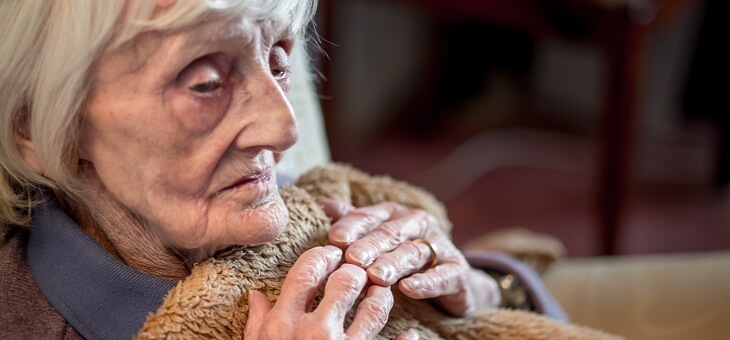A frightening rise in elder abuse during the pandemic is being reported across Australia. And some of the perpetrators are adult children returning to the family home.
Dr Meghan O’Brien, head of social work at Victoria’s Peninsula Health, says alleged elder abuse cases at the health service, including physical assaults and strangulations, have risen by 59 per cent.
The Guardian reports that in New South Wales, the ageing and disability commission received a 25 per cent increase in calls to its helpline in 2020, mostly related to alleged elder abuse. Calls to the NSW seniors’ rights service leapt 75 per cent in 2020 compared with the previous year.
The Guardian claims at least 11 people over the age of 55 died in Australia in 2020 in cases where a younger relative or spouse was charged with their murder.
Seniors rights organisations in Tasmania, the ACT and the Northern Territory also reported increased requests for help in the past year.
Elder abuse is defined as “a single, or repeated act, or lack of appropriate action, occurring within any relationship where there is an expectation of trust, which causes harm or distress to an older person”.
It includes financial, physical, psychological, emotional and sexual abuse or neglect.
The Australian Human Rights Commission reacted to the release of the final report of the Royal Commission into Aged Care Quality and Safety on Monday by releasing a statement saying, “discriminatory attitudes towards ageing can contribute to trivialising, excusing or justifying elder abuse”.
It sought to “embed older people’s human rights in the planning, provision and monitoring of aged care services”.
However, during the pandemic, much of the abuse has occurred in the family home.
NSW ageing and disability commissioner Robert Fitzgerald says the risk factors for elder abuse have intensified during COVID. Increased unemployment and mental health issues and adult children returning to live at home have heightened “underlying tensions” in families.
He believes the closure of libraries and community centres and the cancellation of face-to-face services led to increased isolation for older people, making support harder to source.
“People who aren’t receiving mental health services, who can’t get housing, who are unemployed, who are under financial stress, often go to their parents for help,” says Melanie Joosten, policy officer at Seniors Rights Victoria. “That’s where situations can become abusive.”
Too often “ageing parents (are) seen as the safety net for people who fall through the gaps in other services”, she says.
Read more: Funding boost targets elder abuse
South Australia’s Adult Safeguarding Unit, set up after the abuse and mistreatment of elderly dementia residents at the Oakden Older Persons Mental Health Service in Adelaide, has found adult sons and daughters were allegedly responsible for almost half of all concerns about elder abuse or neglect raised in the past financial year.
The Advertiser reports that 946 calls were made to the SA Elder Abuse Prevention phone line in 2019-20.
“Of those, 306 cases were reported to the unit for further investigation.
“In 27 per cent of calls, adult sons were identified as the alleged perpetrator of abuse or neglect of an older person, while adult daughters were named in 19 per cent of calls.
“The most reported type of abuse was financial (43 per cent) followed by emotional or psychological (36 per cent), neglect (14 per cent) and physical violence (13 per cent).”
The report notes there has been a “noticeable increase in the complexity of reports, particularly related to neglect and family complexities”.
Read more: Banks renew push to curb elder abuse
In late 2020, the University of Queensland announced it was working with 50 social workers across southeast Queensland to create a uniform, national approach to identifying abuse in elderly people who present to hospitals.
It said up to 14 per cent of Australians over the age of 55 experience “some form of physical, financial or emotional abuse at the hands of their carers or family members”.
“Our research project will be focused on understanding why someone commits elder abuse and how social workers can better intervene to break the cycle,” said project leader Professor Jill Wilson.
“Apart from the issues of human rights and protection, increasing abuse rates worry the government because abused older people often lose their asset base and so they cannot pay for care.
“Abuse severely reduces the financial, emotional and physical capacity of older people, and the responsibility of meeting their care needs can get passed onto the state.”
Prof. Wilson said the research was needed because there is no “tried and tested rulebook for dealing with elder abuse in the community”.
Lobby group Aged Care Reform Now was formed to ensure the recommendations of the royal commission were translated into action. But it also has it sights set on elder abuse, Nine reports.
“This is a chance of a lifetime to change this sector, says co-founder Dr Sarah Russell. “Otherwise, we are going to keep hearing about the negligence, keep hearing about abuse, keep hearing about heartbreaking stories and they have to stop.”
Among the group’s demands is the mandatory reporting of elder abuse.
1800 ELDERHelp (1800 353 374) isthe national elder abuse phone line.It automatically redirects callers seeking information or advice on elder abuse to their state or territory phone line service. If you require assistance in an emergency or life-threatening situation, contact 000.
What should be done to counter elder abuse in families? How can we best safeguard elderly Australians?
Read more: Children raid savings during pandemic
If you enjoy our content, don’t keep it to yourself. Share our free eNews with your friends and encourage them to sign up.

